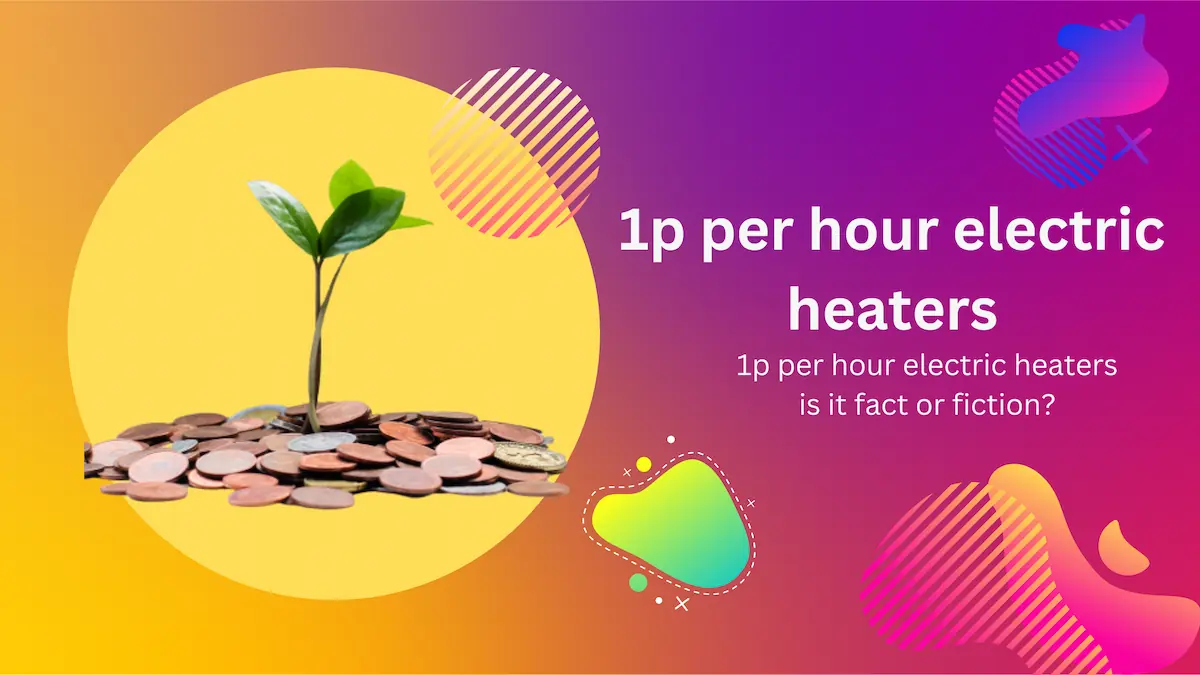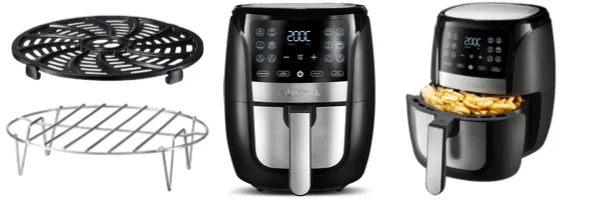Uncovering The Truth Behind 1p Per Hour Electric Heaters: Fact Or Fiction?
The prospect of 1p per hour electric heaters seems too good to be true, doesn’t it? Many people have been lured by the promise of cheap warmth and comfort during cold winter months.
But is there any truth behind this enticing claim, or is it simply a clever marketing ploy? In our quest for energy efficiency and cost-saving solutions, we’ve delved deep into the world of heating options to uncover the reality surrounding these mythical appliances.
1p Per Hour Electric Heaters: Fact Or Fiction?
The Origins Of The 1p Per Hour Electric Heaters Myth
The myth of 1p per hour electric heaters has its origins in misleading marketing tactics by promoters and resellers looking to take advantage of consumers’ desire for low-cost heating solutions, especially now with the cost of living crisis in full effect.
Do 1p Per Hour Electric Heaters Really Exist? Understanding The Claims
In order to determine the veracity of the 1p per hour electric heaters myth, we need to first delve into the basis of these claims. In most instances, manufacturers and promoters of these supposedly low-cost heating alternatives may state that their appliances are more efficient or economical than other types of heating options – owing in part to advanced technology, innovative designs, or superior engineering.
To illustrate this point further, let’s consider an example where a company claims its product offers rapid heat delivery and uses cutting-edge infrared technology. While this might sound impressive on paper and could potentially lead someone to believe they would save money with such a heater, there remain several other factors that must be taken into account – including energy consumption rates during operation and any potential maintenance costs due to complexity in design.
Identifying The Promoters And Resellers of the Myth of 1p Per Hour Electric Heaters
A key aspect of uncovering the truth behind the 1p per hour electric heaters myth lies in identifying the promoters and resellers responsible for spreading these misleading claims.
Among those perpetuating this myth are certain influencers who endorse these supposedly low-cost heating options without delving into their actual efficiency or long-term costs.
A prime example is an electric heater sold by Lakeland, which was widely promoted based on its claim to cost only 1p per night to run.
Even television personalities like Martin Lewis (not throwing shade, just an observation) have been linked with such stories – erroneously as it turns out – causing confusion among consumers while searching for “1p per hour electric heaters Martin Lewis” online.
Factors That Affect Electric Heater Costs
The cost of running an electric heater depends on several factors. One of the most important is the wattage of the heater. The higher the wattage, the more energy it will use and the more expensive it will be to run. Additionally, the cost of electricity in your area will affect how much you pay for each unit of energy used.
Another factor to consider is how long you plan to run your heater each day. If you only need a little bit of heat for a short period of time, then your overall costs will be lower than if you need constant heat throughout the day.
Ideal Conditions vs Real-World Usage
Some manufacturers claim that their electric heaters can run for just 1p per hour. However, this claim is often based on ideal conditions that may not reflect real-world usage.
For example, these claims may assume that your home is well-insulated and that you only need a small amount of heat to maintain a comfortable temperature. In reality, many homes have poor insulation and require more heating power than these ideal conditions account for.
Additionally, these claims may not take into account other factors like room size or outdoor temperature. If you’re trying to heat a large room or using your heater during very cold weather, then your costs will likely be higher than advertised.
Overall Costs When thinking about 1p Per Hour Electric Heaters
While some electric heaters may be able to run for just 1p per hour under certain conditions, in practice most will cost more than this amount over time. This is especially true if you plan on using your heater frequently or during colder temperatures.
It’s important to consider the upfront cost of the heater as well as its ongoing running costs when deciding whether a 1p per hour electric heater is a good investment for your home. While these heaters may be cheaper to run than other types of heating solutions, they may not be the most cost-effective option in the long run.
Other Energy-Efficient Heating Solutions to Consider
Ultimately, if you’re looking to save money on heating costs, there are other energy-efficient solutions that may be more effective than a 1p per hour electric heater. For example, improving your home’s insulation can help keep heat inside and reduce the amount of energy needed to maintain a comfortable temperature.
Alternatively, you might consider investing in energy-efficient heating solutions like heat pumps or solar panels. These options can be more expensive upfront but offer significant savings over time compared to traditional electric heaters.
Understanding Electric Heating
This section will provide a comprehensive explanation of the different types of electric heaters, their energy efficiency, and cost comparisons with gas heating.
Many people are drawn to the idea of a 1p per hour electric heater. It sounds too good to be true, and in many cases, it is. While these heaters may seem like a cost-effective solution for heating your home or office, there are several factors that you need to consider before making a purchase.
The reality is that the 1p-per-hour claim is often misleading as it only refers to the cost of running the heater itself, not the total electricity bill. Hour heaters, particularly fan heaters, are known to consume a lot of energy and can quickly add up to high electricity costs. A 2kw heater running for an hour can use up to 2-kilowatt hours (kwh) of electricity, which can be expensive depending on your energy tariff and rates.
It’s important to consider the wattage and energy efficiency of electric heaters before purchasing them. The wattage will determine how much power the heater uses and how quickly it can heat up a room.
Energy efficiency will determine how much energy is wasted during operation. When shopping for an electric heater, look for models with higher wattage ratings and better energy efficiency ratings.
One thing you should keep in mind is that fan heaters tend to be less efficient than other types of electric heaters because they use fans to circulate hot air around the room. This means that they consume more electricity than other types of electric heaters such as oil-filled radiators or convection heaters.
While 1p per hour electric heaters may seem like a cost-effective solution at first glance, it’s crucial to factor in overall energy costs and usage patterns to determine if they are truly economical in the long run.
For example, if you plan on using your electric fan heater for several hours every day during winter months when temperatures are low outside, your overall electricity bill could become quite high.
To avoid overheating and overheating risks, it’s important to choose an electric heater with the appropriate wattage for your space. A 2kw heater may be too powerful for a small room and could lead to overheating or even fire hazards. On the other hand, a 1kw heater may not be powerful enough to heat up a larger room.
It’s recommended to monitor your electricity bill regularly when using electric fan heaters or any other type of electric heater to ensure you’re not overspending on energy. You can also consider using a smart thermostat or timer to control your heating usage and reduce energy waste.
Different Types Of Electric Heaters
Understanding the variety of electric heaters available in the market is crucial to make an informed decision about which one best suits your needs. Here are some common types of electric heaters:
1. Convection Heaters: These heaters warm up the air by passing it over a heating element and then circulate it throughout the room, providing a consistent temperature.
2. Panel Heaters: Slim, wall-mounted units that use convection to heat a space quickly and efficiently, often featuring thermostats and timers for better control.
3. Oil-filled Radiators: Designed to mimic traditional radiators, they contain oil that is heated by an internal heating element, providing prolonged warmth even after the heater is switched off.
4. Infrared Heaters: Using infrared radiation to heat objects directly instead of warming the air first, these heaters offer instant warmth and minimal energy loss.
5. Fan Heaters: Equipped with a fan to distribute warm air throughout the room rapidly, these heaters are compact and portable but can be noisier than other options.
6. Night Storage Heaters: Utilising cheaper off-peak electricity rates during nighttime hours, these heaters store energy in ceramic bricks or other materials and release it gradually throughout the day as needed.
7. Underfloor Heating Systems: Installed beneath flooring surfaces, these systems provide even distribution of heat across an entire room without occupying any visible space.
By exploring these different types of electric heaters and their unique features, you can better understand which option might be more efficient and economical for your specific heating needs.
Heat Generation And Energy Efficiency
Electric heating works by converting electrical energy into heat energy through different methods such as convection, conduction or radiation. When it comes to energy efficiency, electric heaters are considered 100% efficient since they turn all electricity used into heat.
However, this doesn’t guarantee that they are cost-effective to run. To determine the actual running costs of an electric heater, factors like wattage rating and length of usage need to be taken into consideration.
Additionally, some types of electric heaters like fan heaters may use additional electricity for powering the fan making them less efficient than panel heaters which operate silently without using extra power.
Cost Comparisons With Gas Heating
Comparing the costs of gas and electric heating can be a challenging task due to the numerous factors that influence their energy consumption and overall efficiency. However, a general understanding of the cost differences can help homeowners make informed decisions when choosing their preferred heating system.
| Heating Type | Initial Cost | Running Cost | Energy Efficiency |
| Gas Heating | Higher upfront cost due to boiler installation | Lower running cost at around 4.65p per kilowatt-hour | Can achieve up to 90% efficiency with modern condensing boilers |
| Electric Heating | Cheaper upfront cost for electric heaters | Higher running cost at around 10p per kilowatt-hour | Can reach close to 100% efficiency as all energy is converted into heat |
From the table above, it is clear that gas heating tends to have a higher upfront cost due to the installation of a boiler. However, the running cost is significantly lower at around 4.65p per kilowatt-hour, making it more cost-effective in the long run. Additionally, modern condensing boilers can achieve up to 90% efficiency, which means that most energy is converted into heat.
On the other hand, electric heating is cheaper in terms of initial investment, but the running costs are higher at around 10p per kilowatt-hour. Despite this, electric heaters can reach nearly 100% efficiency since all the energy is used to generate heat. This makes them a more environmentally friendly option compared to gas heating.
It is important to note that these cost comparisons are not set in stone, as individual circumstances and energy tariffs can greatly affect the overall costs of each heating system. However, this general overview can help guide homeowners in making the right decision for their needs and budget.
Ideal conditions vs real-world situations
The advertised cost of running a 1p per hour heater is typically based on ideal conditions that are rarely achievable in real-world situations. For example, if you have a small room with good insulation and use the heater sparingly, you may be able to achieve close to this cost per hour. However, if you have a larger room or poor insulation or use the heater frequently, your actual cost could be much higher.
Quality and efficiency
Another factor to consider when looking at 1p per hour electric heaters is their quality and efficiency. Some cheaper models may use less efficient heating elements that can result in higher energy consumption over time. It’s important to do your research and choose a high-quality model that will provide reliable performance while keeping running costs low.
Electric vs other heating systems
While electric heaters can be a convenient and cost-effective way to heat a room, they are generally less efficient than other heating systems such as gas or oil boilers. This means that while they may be cheap to run initially, they could end up costing more in the long run due to higher energy consumption.
Other energy-saving measures
To get the most out of your 1p per hour heater (or any type of heating system), it’s important to use it in conjunction with other energy-saving measures such as insulation, draught-proofing, and smart heating controls. These measures can help reduce overall energy consumption and running costs while keeping your home warm and comfortable.
Factors to Consider Before Buying a 1p Per Hour Electric Heater
Room Size
When considering purchasing a 1p per hour electric heater, one of the most important factors to consider is the size of the room where you plan to use it. A larger room will require a heater with a higher wattage output to effectively heat the space. It’s important to choose a heater that can handle your room size, or else you’ll end up wasting energy and money.
To determine the correct wattage for your space, you can use a simple formula: multiply the square footage of your room by 10 watts. For example, if your room is 200 square feet, you’ll need a heater with at least 2,000 watts of power.
Energy Efficiency
Another important factor to consider when buying a 1p per hour electric heater is its energy efficiency rating. Look for heaters that have high energy efficiency ratings so that you are getting the most out of your electricity usage. This will not only save you money on your energy bills but also reduce your carbon footprint.
One way to determine if a heater is energy efficient is by looking for an Energy Star label. This label indicates that the product has been certified by an independent organization as meeting strict guidelines for energy efficiency.
Safety Features
Safety should always be a top priority when choosing any type of heating appliance, including electric heaters. Check for safety features such as overheat protection and tip-over switches to prevent accidents and ensure that the heater automatically shuts off if it overheats or tips over.
Overheat protection is particularly important because it prevents fires from starting due to overheating components in the heater. Tip-over switches are also crucial because they shut off power to the unit if it falls over or gets knocked down accidentally.
The Reality Of Running Costs
While the promise of 1p per hour electric heaters may seem tempting, the reality is that electricity costs make this claim impossible. In this section, we’ll dive deeper into the factors affecting electricity consumption and provide a realistic breakdown of running costs to help you make an informed decision.
Factors Affecting Electricity Consumption
Electricity consumption for electric heaters is affected by several factors, including:
– The size of the room: Larger rooms will require more energy to heat up and maintain a comfortable temperature.
– The insulation of the building: Well-insulated homes will retain heat more effectively, reducing the need for additional heating.
– The desired temperature: The higher the desired temperature, the more energy will be required to achieve and maintain it.
– The type of heater: Different types of electric heaters have varying levels of energy efficiency. For example, ceramic heaters are generally more efficient than halogen heaters.
– How often the heater is used: Regular use of an electric heater will increase energy consumption and lead to higher bills.
It’s important to consider these factors when using an electric heater and to choose a heater that meets your needs while being mindful of energy consumption.
Calculating Realistic Electricity Costs
To calculate the realistic electricity costs of an electric heater, you need to consider several factors. Firstly, you need to know the power (kilowatt) of your heater and how long you intend to use it.
For instance, suppose you have a 2-kW heater that runs for four hours each day.
Secondly, you must look up the cost of one kilowatt-hour (kWh) in your area using your energy supplier’s tariff.
Finally, multiply the number of kWh consumed by the cost per unit to find out what it will cost to run your electric heater each day.
It’s worth noting that cheaper heaters often have a lower wattage and therefore consume less power but may not provide sufficient heat output as required if placed in a large room or office space.
The Impact On Your Energy Bills
The impact of heating your home can be felt quite literally in your wallet. With energy bills skyrocketing during colder months, it’s important to understand the true cost of running an electric heater.
While the myth of 1p per hour electric heaters may seem tempting, the reality is that low-wattage heaters used during Economy 7 hours can still cost around 10p per hour to run.
This may not sound like much, but it adds up quickly over time and can significantly increase your monthly bill.
Mythbusting: Common Misconceptions About Electric Heating
Many people believe that electric heating is less powerful and comfortable compared to gas heating, however, this section of the article aims to debunk these common misconceptions and provide a clearer understanding of the benefits of electric heaters.
“Electric Heating Is Less Comfortable”
It’s a common misconception that electric heating is less comfortable than other forms of heating. This assumption may stem from the fact that older models of electric heaters used to emit dry, stuffy air, resulting in discomfort for some people.
Moreover, unlike central heating systems which require time to warm up an entire house before the desired temperature can be achieved; electric heaters offer targeted heat where it’s needed most- thus providing more convenience and control over your home’s temperature.
Additionally, being able to select different levels of warmth means you can tailor your environment to suit personal preferences.
“Electric Heating Is Not Powerful Enough”
One of the biggest myths surrounding electric heating is that it’s not powerful enough to heat a home, especially during colder months. However, this couldn’t be further from the truth.
Many modern electric heaters are designed with advanced heating elements and technology that provide efficient and effective warmth throughout your home.
It’s important to note that when comparing the power output of different heating systems, size and wattage matter. It’s essential to choose an appropriately sized heater for the room you want to heat.
Electric heaters come in various sizes and shapes, from portable fan heaters suitable for smaller rooms to larger wall-mounted panel radiators that can efficiently warm up bigger spaces.
The Benefits Of Electric Heating
Electric heating offers various benefits such as convenience, safety, and customizable heating options.
Convenience And Ease Of Use
Electric heaters offer a convenient and user-friendly way of heating our homes. Unlike gas heaters, they require no complex installation or maintenance procedures. Simply plug them into an electrical outlet and switch them on, and you’re good to go! They are also easy to move around your home compared to other heating systems as they are usually lightweight and portable.
Many models come with features that allow for customised heating options such as temperature control settings, timers, and thermostats among others making it easier for users to set their preferred room temperatures.
Additionally, electric heaters heat up quickly so you do not have to wait long before experiencing the warmth in your room.
Electric heating is considered safer than gas since there’s no risk of carbon monoxide poisoning or explosions that may result due to issues like faulty pipes or leaking gas cylinders.
Safety And Environmental Considerations
Electric heating is a safer and more environmentally-friendly option than traditional gas heating systems. Here are some factors to consider:
– Electric heaters do not produce harmful by-products such as carbon emissions at the point of use, making them an eco-friendlier choice.
– Unlike gas heaters or furnaces, electric heaters do not require fuel storage tanks or release potentially dangerous gases, reducing the risk of explosions and fires.
– Electric heaters have built-in safety features such as automatic shut-off switches that prevent overheating or tipping over. This reduces the risk of accidents and makes them a safer option for households with children or pets.
– Many electric heaters are fan-forced, which means they distribute heat evenly throughout the room. This can reduce hotspots and minimise fire risks caused by flammable materials coming into contact with high temperatures.
– Additionally, electric blankets are often considered safer than space heaters as they don’t get as hot and can be switched off when not in use.
By understanding these safety and environmental considerations, you can make an informed decision when choosing between different heating options.
Customisable Heating Options
One of the major benefits of electric heating is its customisability. With electric heaters, you have complete control over the temperature and timing of your heating, which can be adjusted based on your preferences or daily routine.
This level of precision allows for better energy management and cost savings in the long run. For instance, some smart electric heaters come with a built-in thermostat that keeps track of room temperature and adjusts heating levels accordingly to save energy.
Electric heating also offers flexibility in terms of design and installation. There are many different types of electric heaters available on the market, from convection radiators to infrared panels; these often come in different sizes and shapes so you can choose one that suits your needs best.
Electric underfloor heating is another option if you prefer an invisible source of heat without taking up any space on walls or floors.
The Best Electric Heaters For Energy Efficiency
Explore the top picks for low-cost and energy-saving heaters, comparing them with traditional radiators to highlight their benefits in terms of cost savings and eco-friendliness.
Top Picks For Low-Cost And Energy-Saving Heaters
Looking for affordable and energy-saving electric heaters? Check out our top picks below:
1. Dimplex OFRC20C Electric Oil Free Column Heater: This heater is incredibly efficient and heats up quickly, thanks to its oil-free design. It’s also easy to move around your home, making it a versatile option.
2. Duronic HV102 Radiant Convector Heater: This compact heater is perfect for small spaces and has three settings for maximum control over your heating needs. It also comes with a built-in thermostat, ensuring that you don’t waste any energy.
3. Pro Breeze 2000W Ceramic Fan Heater: If you’re looking for a powerful heater that won’t break the bank, this ceramic fan heater is an excellent choice. Plus, it’s super quiet and has multiple safety features to give you peace of mind.
4. VonHaus Portable Electric Heater: Another affordable option, this portable electric heater has an eco mode that can help save on energy costs without sacrificing warmth.
5. MeacoHeat Motion Eye 1.8kW Panel Heater: While slightly pricier than some other options on this list, the MeacoHeat Motion Eye panel heater is incredibly efficient and comes with smart motion sensor technology that can detect when someone enters or leaves the room.
By choosing one of these low-cost but high-performing electric heaters, you can stay warm while keeping your energy bills in check – all while contributing to a more sustainable lifestyle!
Comparing With Traditional Radiators
In this section, we will compare the energy efficiency and running costs of electric heaters with traditional radiators, highlighting their key differences and similarities.
| Features | Electric Heaters | Traditional Radiators |
| Energy Efficiency | Generally more energy-efficient due to individual room control and no heat loss in pipes. | Can be less energy-efficient, especially in older central heating systems with heat loss in pipes. |
| Running Costs | Lower running costs due to energy efficiency, but can be higher if electricity prices are higher than gas. | Can have lower running costs if gas prices are lower than electricity, but efficiency can impact costs. |
| Installation Costs | Typically lower installation costs, with no need for a boiler or pipework. | Higher installation costs for boiler and pipework, but costs can be offset by lower gas prices. |
| Environmentally Friendly | Produces no direct emissions, and can be powered by renewable energy sources. | Produces CO2 emissions from burning gas, and requires regular maintenance to reduce environmental impact. |
| Heating Speed | Heats up quickly, allowing rapid temperature adjustments in individual rooms. | Can take longer to heat up, especially in larger homes with multiple radiators needing to reach temperature. |
| Maintenance | Generally low maintenance, with no boiler or pipework to maintain. | Requires regular maintenance, including boiler servicing and potential pipe repairs or replacement. |
As evident from the table, electric heaters and traditional radiators each have their pros and cons, making a choice between them largely dependent on your specific needs and priorities, such as energy efficiency, running costs, and environmental impact.
Misleading Claims And Scams In The Heating Industry
Beware of unreliable sources and misleading marketing tactics when it comes to heating systems, as the industry is not immune to scams; read on to discover how to make an informed decision.
Identifying Unreliable Sources
It is essential to identify unreliable sources when researching electric heaters, particularly in the face of misleading claims and scams. One way to spot suspicious sources is to look out for exaggerated or unsupported statements about an electric heater’s running costs or energy efficiency.
For example, scammers have been caught selling dangerous electrical goods such as plug-in mini heaters on e-commerce platforms with fake reviews and dodgy ads. Alpha Heater – a company under scrutiny for potentially misleading customers into purchasing their product without proper research – also serves as a cautionary tale that highlights the importance of vigilance when it comes to identifying reliable sources.
Understanding Misleading Marketing Tactics
Misleading marketing tactics are commonly used by scammers in the heating industry to lure customers into buying low-cost electric heaters that are not as efficient as advertised. Here are some of the common tactics to watch out for:
1. False Energy-Saving Claims – Many adverts claim that their products can save you money on your energy bills, but in reality, their savings claims might be exaggerated or misleading.
2. Misleading Comparisons – Some ads might use deceptive comparisons to make their product seem like a better deal than traditional heating systems such as gas boilers.
3. Overstated Heating Capabilities – Scammers might exaggerate the heat output of their products to make them appear more powerful and effective than they really are.
4. Hidden Costs – Beware of hidden costs such as installation fees or additional maintenance expenses that may not be disclosed in the ad.
5. Limited-Time Offers – Some ads may pressure you into making a quick decision by offering limited-time deals or discounts that may not be genuine.
It’s important to do your research and look out for these tactics so that you can make an informed decision when buying an electric heater. Remember, if a deal seems too good to be true, it probably is!
Making An Informed Decision
Consider the cost of running an electric heater and weigh other factors such as your heating needs, room size, and lifestyle when choosing a heating system that best suits you.
Understanding The True Cost Of Running An Electric Heater
The true cost of running an electric heater can often be misleading, with many believing that they can run for just 1p per hour. However, the actual cost depends on various factors such as the energy tariff, type of heater, and power output.
Another important factor affecting electricity consumption is how much heat is required in a particular room or space. For instance, if you have a large room with a high ceiling, it will require more heating than a smaller room with a standard ceiling height resulting in higher energy consumption and ultimately greater operating costs.
Other Factors To Consider When Choosing Heating Systems
It’s important to consider a few other factors when choosing the right heating system for your home.
1. Property insulation – A well-insulated property will retain heat better, requiring less energy to maintain a comfortable temperature.
2. Heating requirements – The size of your room, the level of insulation, and your heating needs will all affect which heating system you choose.
3. Lifestyle – Consider your daily routine and how often you’re at home during the day. For example, if you work from home or have young children, you may need more constant heat than someone who works outside the house all day.
4. Initial installation cost – Some heating systems may require costly installation or modifications to your property before they can be used effectively.
5. Maintenance and repair costs – Be sure to consider ongoing maintenance costs and any potential repair costs associated with different heating systems, as these can add up over time.
6. Environmental impact – Consider the environmental impact of different heating systems and choose one that is energy-efficient and has minimal carbon emissions.
7. Heating controls – A good heating control system allows you to set temperature schedules in individual rooms or zones within a property for optimal comfort while saving energy.
By taking all of these factors into account alongside running cost calculations, you can make an informed decision on the best heating system for your home that will help you save money and reduce environmental impact in the long run.
Conclusion: Debunking The 1p Per Hour Electric Heater Myth And Saving Money On Heating Costs
In conclusion, the myth of 1p-per-hour electric heaters has been finally debunked. The reality is that the cost of electricity makes it impossible for such a heater to exist.
While there are various electric heating options available, it’s essential to understand their running costs before making an informed choice. By considering factors like energy efficiency and calculating realistic electricity costs, you can save money on heating bills without falling prey to false marketing tactics and unreliable sources in the industry.
What is the cheapest electric heater to run?
Infrared heaters are the cheapest electric heater to run because they provide the lowest wattage per heat. Oil-filled heaters are also cost-effective due to their long-lasting heat, while storage heaters can save on running costs by using off-peak electricity tariffs. Therefore, if you are looking for the cheapest electric heater to run, an infrared heater may be your best option.
What is the cheapest electric heater to run per hour UK?
There are several options for electric heaters that are cheap to run per hour in the UK. According to our experts at Hazloez, halogen heaters are recommended as a cheap source of heating, with running costs of around 41p per hour.
Infrared heaters are another option, costing around 26p per hour on average. Additionally, electric radiators are a cost-effective option, with a 1kW model costing around 34p per hour. It is important to consider the size and power of the heater, as well as any additional features such as timers, as these factors can affect the running costs.










